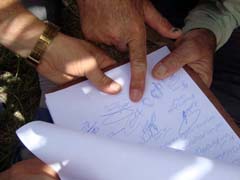A nationwide campaign has started in Iraq to collect one million signatures from Iraqi nationals to call for the trial of the members of the anti-Iran terrorist Mojahedin-e Khalq Organization (MKO, also known as the MEK and PMOI) and accelerate their expulsion from Iraq. 
According to a report published by the Habilian Association, a human rights group formed of the families of 17,000 Iranian terror victims, the Association of Justice to Defend Iraqi Victims of MKO declared that the first stage of the signature gathering campaign in Diyala province has finished with a total of 40000 signatures.
Secretary-General of the Association of Justice Dr. Nafie Isa told Habilian that the result of the process in other provinces will be announced and made public in the coming days.
Owing to the people’s significant participation, the executive committees of the campaign in other provinces have announced the need for more signature forms.
Hitherto, many university professors and school teachers, young people, university students, tribal elders, politicians, artists, women, and civil society activists in Diyala province have signed the campaign.
The MKO has been in Iraq’s Diyala province since the 1980s.
The MKO is blacklisted by much of the international community, including the United States.
Before an overture by the EU, the MKO was on the European Union’s list of terrorist organizations subject to an EU-wide assets freeze. Yet Maryam Rajavi, who has residency in France, regularly visited Brussels and despite the ban enjoyed full freedom in Europe.
The MKO is behind a slew of assassinations and bombings inside Iran, a number of EU parliamentarians said in a recent letter in which they slammed a British court decision to remove the MKO from the British terror list. The EU officials also added that the group has no public support within Iran because of their role in helping Saddam Hussein in the Iraqi imposed war on Iran (1980-1988).
Many of the MKO members abandoned the terrorist organization while most of those still remaining in the camp are said to be willing to quit but are under pressure and torture not to do so.
A May 2005 Human Rights Watch report accused the MKO of running prison camps in Iraq and committing human rights violations.
According to the Human Rights Watch report, the outlawed group puts defectors under torture and jail terms.
The group started assassination of the citizens and officials after the revolution in a bid to take control of the newly established Islamic Republic. It killed several of Iran’s new leaders in the early years after the revolution, including the then President, Mohammad Ali Rajayee, Prime Minister, Mohammad Javad Bahonar and the Judiciary Chief, Mohammad Hossein Beheshti who were killed in bomb attacks by MKO members in 1981.
The group fled to Iraq in 1986, where it was protected by Saddam Hussein and where it helped the Iraqi dictator suppress Shiite and Kurd uprisings in the country.
The terrorist group joined Saddam’s army during the Iraqi imposed war on Iran (1980-1988) and helped Saddam and killed thousands of Iranian civilians and soldiers during the US-backed Iraqi imposed war on Iran.
Since the 2003 US invasion of Iraq, the group, which now adheres to a pro-free-market philosophy, has been strongly backed by neo-conservatives in the United States, who also argue for the MKO to be taken off the US terror list.

